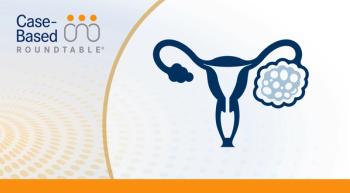
Study Investigates Nab-Sirolimus Plus Letrozole in Advanced Endometrial Cancer
A phase 2 study has begun enrolling patients with 0 to 1 prior lines of therapy to receive the mTOR inhibitor nab-Sirolimus plus letrozole for advanced or recurrent endometrioid carcinoma.
A phase 2 study investigating the combination of nab-Sirolimus plus letrozole (Femara) in patients with advanced or recurrent endometrial cancer began enrollment in December 2023, according to a poster presented at the
The phase 2, open-label, single-arm EEC-201 study (NCT05997017) is currently enrolling an estimated 29 patients at 6 centers to receive the combination with a primary end point of investigator-assessed best overall response rate (ORR) per RECIST v1.1.
“Despite recent data demonstrating improved outcomes with immunotherapy plus chemotherapy, regardless of mismatch repair [MMR] status, alternative treatment options for patients with advanced or recurrent endometrial carcinoma remain necessary,” the investigators stated in their poster.
In endometrioid endometrial carcinoma, over 80% harbor PTEN or PI3K/AKT/mTOR pathway alterations. Crosstalk between the estrogen receptor and PI3K/AKT/mTOR pathway have been observed at multiple points, making combined mTOR inhibitor and endocrine therapy a viable strategy. The phase 2 GOG-3007 study (NCT02228681) investigated the combination of everolimus with letrozole and showed clinical benefit including a median progression-free survival of 28 months in chemotherapy-naive patients with metastatic disease compared with 4 months in patients with prior chemotherapy.2 All patients who benefited from the combination had endometrioid histology.
Nonclinical data showed that nab-Sirolimus, an intravenous (IV) nanoparticle albumin-bound mTOR inhibitor, had improved tumor accumulation, mTOR inhibition, and tumor growth suppression compared with oral mTOR inhibitors including 12-fold tumor concentration vs oral everolimus in mouse models.3
The phase 2 study is enrolling adult patients with metastatic or locally advanced endometrioid endometrial carcinoma that cannot be surgically resected.1 They must be mTOR inhibitor naive, have an ECOG performance status of 0 or 1, and at least 1 measurable target lesion at baseline. They could have received adjuvant chemotherapy, hormonal therapy, or checkpoint inhibitor that was completed at least 6 months prior to enrollment and must have been treated with 0 or 1 prior chemotherapy regimens in the advanced/recurrent/metastatic setting, which must have been completed at least 3 months prior to enrollment. Nonchemotherapy treatment is allowed provided therapy ended at least 4 weeks prior to enrollment.
The study uses a Simon’s optimal 2-stage design enrolling 10 patients in stage 1, and 19 more patients in stage 2 if 1 patient responds in stage 1. Patients are to receive 100 mg/m2 of IV nab-Sirolimus on days 1 and 8 of a 21-day cycle, plus 2.5 mg oral letrozole daily, until disease progression, unacceptable toxicity, withdrawal of consent, or at investigator discretion. The starting dose may be reduced if 3 of the first 6 or 4 of the first 10 patients have a dose reduction in the first 4 months. Patients will receive CT/MRI every 6 weeks for the first year and every 12 weeks thereafter until disease progression.
In addition to the primary end point of ORR, secondary end points include duration of response, disease control rate, PFS, time to response, overall survival, and safety. Exploratory end points include baseline molecular biomarkers and genomics, as well as association between molecular/genomic profile and clinical outcome using next-generation sequencing and immunohistochemistry.
Platinum-based chemotherapy is the standard of care for recurrent disease. Although in patients with deficient MMR who have progressed after prior platinum-based therapy, including neoadjuvant or adjuvant therapy, single-agent immune checkpoint inhibition with pembrolizumab (Keytruda) or dostarlimab (Jemperli) are approved.4 Lenvatinib (Lenvima) plus pembrolizumab can be given for those with proficient MMR. Dostarlimab plus chemotherapy




















